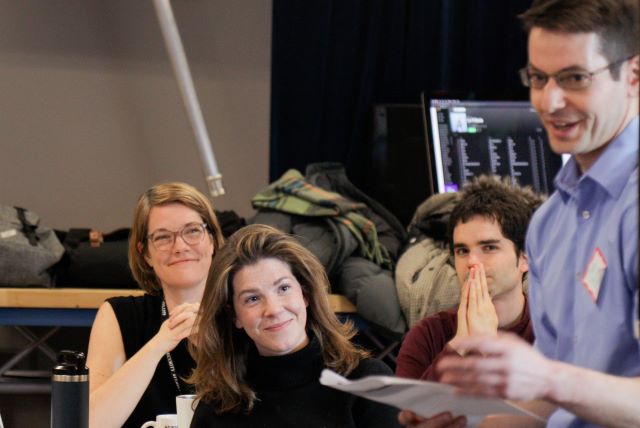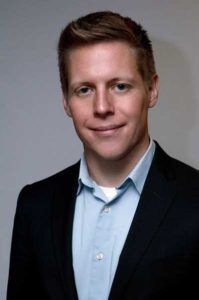
Launched in Boston, Massachusetts, in 2018, the Scientific Citizenship Initiative (SCI) aims to make science “more socially responsive and responsible” by expanding STEM student training in leadership, communication, and ethics, and developing fellowships for scientists to serve in their communities. The initiative is led by Angela DePace, the founding faculty director of SCI, and Daniel Pomeroy, SCI’s executive director, who marshal their experiences in science communication and policy to chart SCI’s course. As a systems biology professor at Harvard University, DePace conducts fundamental research, while teaching and advising students interested in multiple STEM career paths. She also collaborates with colleagues from across Harvard to build curricula that support responsible governance of technology and effective civic engagement. Pomeroy, who holds a Ph.D. in physics and is a former AAAS policy fellow, talked to ESAL about SCI’s mission.

Dan Pomeroy
CK: What is your policy background and why did you join SCI?
Pomeroy: For the last five years I worked to build MIT’s Policy Lab at the Center for International Studies, which was created to address the disconnect between academia and public policy. We developed a unique model of engagement that focuses on building relationships between MIT researchers and public policy audiences. For me, joining SCI is a really exciting opportunity to go beyond facilitating these one-on-one connections and actually look at the underlying problems that prevent science from engaging with society more broadly. At SCI, we’re looking at how we can provide the incentives, training, and resources to make this happen more naturally on its own. I also really enjoy the challenge of building new programs that address unique societal challenges. Working in this space allows for a lot of creative thinking to test out new ideas and the possibility of building models of engagement that others may use.
CK: What’s the science policy landscape in Boston right now?
Pomeroy: There’s also a lot of interest and expertise in science policy throughout the Boston area. For example, we have many active student-led groups in science policy at multiple universities including Harvard, MIT, Brandeis, and Tufts. There are also many university centers and initiatives doing incredible work at the interface of science and policy. Outside of academia, the Union of Concerned Scientists, which advocates for equitable science-based policy solutions on both a state and federal level, is based here in Harvard Square. Also, because Boston is such a hub of universities, international government agencies, such as the British consulate, have science policy advisors based here. So, I think that there is a lot of interest and a lot of demand, but I think that the community is a bit disjointed right now. One of the goals of SCI is to think about how to bring these communities together and marshal what they know collectively to inform our programming.
CK: What are SCI’s main goals?
Pomeroy: The mission is to make science more socially responsive and responsible by empowering scientists to collectively engage with and lead their communities and societies. The way I think about that is to really make the scientific endeavor more connected to the needs of society. We want to develop training programs for graduate students so that they're prepared for careers in all aspects of society, not just academia. We also want to embed societal concerns into academic education. For example, adding discussions of ethical issues into classes on emerging gene editing technology. Ultimately, we hope to move the underlying incentives and culture within academia so that engaging more broadly with society throughout the research process is something that's viewed as normal and valuable.
CK: What are the biggest opportunities for SCI?
Pomeroy: Right now we’re seeing significant student demand for the types of programs we will be developing at SCI. In addition, many faculty and administrators are beginning to support societal engagement. This demand combined with motivated and passionate people working with SCI will provide significant opportunity to develop new programs. However, to be successful we will have to show the value of these programs, not just to the students in their careers, but also the value to the university. Making this case will involve looking at how SCI programs help to achieve goals such as recruiting new students, increasing and supporting the diversity of students at Harvard, publication rates, etc. By tracking metrics like these we will be able to determine which programs are most successful and create an evidence-based case for why they are good, not just for the trainee, but for the research itself.
CK: Tell me more about the fellowship program you are about to launch: what are you looking for in candidates and what kind of training will they receive?
Pomeroy: Last year we placed two STEM graduate students in the Massachusetts State House for part-time summer fellowships. This year we are expanding the program to four. The fellows will be integrated as policy advisors to provide scientific advice and analysis to whichever member they're working for. The goal for the student is really to gain professional experience and have an impact informing state-level policy. The program will run for 10 weeks over the summer and we'll be providing an orientation program before it as well as a mentorship throughout. The type of students that we're looking for are those who have demonstrated policy interests but are not experienced with policy because it's really supposed to be a career development program.
CK: What kind of impact do you envision SCI will have?
Pomeroy: I think about it in stages. First, we want to better train students for the real world both in terms of developing academic research that is informed by real world problems, but also addressing the fact that most students don't stay in academia and want to be trained for a variety of impactful careers. From there, we need to convince more Principal Investigators to value and support their students when they want to participate in this sort of outside engagement with the real world. Then the next step would be for faculty to really value this engagement as part of a career within academia. Ideally, we want people to go from viewing outside engagement as an extracurricular activity to viewing it as something that is part of what it means to be an academic. Finally, to really scale this culture change, I am personally very interested in thinking about how federal science policy and funding could be used to encourage the rest of academia to adopt the types of programs we will be creating at SCI. We already know there is some interest at the federal level for training in the skills required for civic science, as SCI’s first grant came from NIH to develop new training programs. However, as we develop SCI, it will be interesting to see how our work can inform future federal policies around supporting societal engagement.
Are you involved with an organization or effort that you think might be of interest to the ESAL community? Or have heard about an organization or initiative that you’d like to learn more about? Let us know here, and we may feature it in a future post.